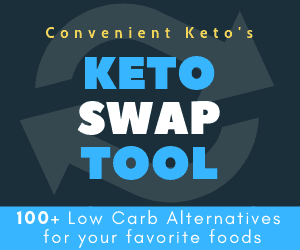As essentially professional grocery aisle roamers, we are peculiarly adept at spotting new products with the word KETO on the label. I distinctly remember how excited we were the first time we stumbled across the words “Keto Certified” on some Dang Bars at Whole Foods.
At the time, my immediate thought was it was a sign that keto had truly become much more mainstream and accessible. I giddily imagined seeing Keto Certified alongside those oh-so-familiar labels like USDA Organic, Non-GMO Project Certified, or Kosher.
Keto wasn’t going anywhere any time soon!
But, then I thought, wait a minute, just what does Keto Certified mean exactly? What is required to become Keto Certified? Who regulates the Keto Certified label?
The answers to those questions are not overtly obvious.
So, searching for “keto certified”, the first result tells you that Keto Certified is a product of the Paleo Foundation, a private entity.
Wait, wait wait. What does Paleo have to do with keto? Paleo foods are centered around whole, less-processed foods that humans can gather. Keto doesn’t necessarily have anything to do with that.
Let’s dig deeper.
The Keto Certified Standards
On the Paleo Foundation website, you can find a list of the standards that must be met in order for a product and/or brand to become Keto Certified.
Here’s a link: https://paleofoundation.com/wp-content/uploads/2019/10/KETO-Certified-Standards-October-2019-.pdf
[And, just in case they pull that link in the future, here’s a copy we took.]
The Mission Statement
According to the PDF, a belief of the group behind Keto Certified is that improving “palatability, availability, affordability, and convenience of compliant foods is crucial to preventing diet
discontinuation.”
Moreover, “The Paleo Foundation’s mission to help improve the tolerability of the
ketogenic diet.”
In other words, the goal is to highlight keto-friendly products that make the keto diet more convenient so that people can stick to the keto diet longer.
That sounds eerily similar to our mission statement. We couldn’t have written it better ourselves.
So far, so good!
But, the operative word above is “compliant.” Let’s take a look at the guidelines to see if the ingredients they deem to be compliant actually reflect the spirit of the mission statement.
Keto Certified Standards and Guidelines
This is where things start to get really interesting. Suffice it say that the Keto Certified standards are all over the place. There are so many amazing nuggets in the keto certification guidelines, I don’t even know where to start.
Here are a few highlights:
- They explicitly allow IMO aka isomaltooligosaccharides! You might know from our tapioca fiber post that IMO is a big no-no on keto diets.
- But somehow FDA-approved dextrin aka soluble corn fiber is not on the allowed list.
- Sugar alcohols are allowed except for maltitol. We are assuming this is because maltitol has a glycemic index (GI) of 35. But, honey is allowed, with a GI of around 58.
- It’s likely not because of the laxative effect of maltitol either, since sorbitol can be laxative and is allowed.
- Zero-glycemic sucralose and aspartame aren’t allowed, even though xylitol is allowed, with a GI of 12.
- There are absolutely no guidelines on protein intake. Keto is low carb, high fat, adequate protein after all.
- Whey protein is known to majorly spike insulin, which then inhibits ketogenesis. However, it’s explicitly allowed.
- All you need to do is sign an affidavit stating your application is true and correct. There’s no auditing process. You just upload your nutrition label and pay a fee. We’re using the trust system! The Paleo Foundation doesn’t perform any testing of how the product affects blood glucose or ketone levels.
As you can see, there are a ton of inconsistencies and oddities in the Keto Certified guidelines that have nothing to do with increasing the tolerability of the keto diet, the aforementioned mission statement.
But, let’s just give them the benefit of the doubt and try to logic our way through this.
Okay, soybean oil isn’t allowed, maybe because of trans fats. But corn oil is okay which does have trans fat. But sunflower oil is also okay? They can’t be against processed vegetable oils then. So are they against soy? No, that can’t be, because soy protein is allowed. Okay, maybe they are against PUFAs (polyunsaturated fat acids), but wait, almond flour has one of the highest amounts of omega-6 PUFA in any food. Alright, maybe they are against processed foods in general. But, ingredients like IMO are extremely processed, not even close to being a whole food…
I could keep going, but it’s clear that things are just not adding up.
Case in Point
Here’s an example that speaks for itself.
Betaquik is a drink that medical doctors prescribe to patients on ketogenic diets. It is an MCT emulsion (basically a shake) that is specifically formulated for the ketogenic diet.
But, alas, Betaquik would not meet Keto Certified standards due to the use of sucralose, a banned sweetener!
Yes, a product designed by medical professionals specifically for a ketogenic diet would not pass Keto Certified standards.
And therein lies the problem.
A Lack of Consistency
Keto Certified can’t seem to find its identity. The name strongly implies that the certification is all about foods that are keto-friendly. However, we know that’s not the case based on all the aforementioned examples.
It hints towards “clean keto” by favoring whole, unprocessed foods. They even inexplicably allow whole foods an additional 2g net carbs of leeway over their less-natural counterparts! However, there’s really no basis for this exception, other than likely being a byproduct of the certification’s Paleo roots. (It could be the additional fiber in whole foods, but not all foods have fiber. Either way, it’s tough to make such a generalization on carbohydrate impact).
Furthermore, Keto Certified appears to stand against processed foods, but allows ingredients like erythritol, which is a highly processed ingredient derived from corn.
Here’s another interesting tidbit. You may know of Mark Sisson, the guy who started Primal Kitchen. He also happens to be on the Keto Certified board. Primal Kitchen bars include a ton of IMO, yet they don’t count IMO as a fiber on the nutrition label! However, Keto Certified guidelines state that IMO can be subtracted from total carbs when calculating net carbs. So, why didn’t Primal Kitchen list IMO as a fiber then?
More Lax Guidelines Over Time
To make things even more interesting, the Keto Certified standards have loosened over time. Yes, guidelines and standards are always subject to change to adapt to new scientific and market developments.
However, these changes are different. The original Keto Certified guidelines simply stipulated that qualified products did “not contain more than 10% carbohydrate content” per serving. It’s not apparent how this percentage was determined, but it would be hard for many products to fulfill that requirement.
Over time, the Paleo Foundation tweaked the standards to be much less restrictive.
For example, comparing the original to current standards, sugar alcohols were originally explicitly disallowed, yet now they are now acceptable.
Also, they grouped some products into a new Meal Replacements category that allows for 10-12g net carbs per serving. There’s no reason to give special standards to a Meal Replacement Product when you can eat a normal meal that is below 10-12g net carbs.
Ulterior Motives?
The less restrictive Keto Certified standards become, the more products and brands can qualify. And, slice it however you want, but that leads directly to more profits annually for the Paleo Foundation.

The harm?
I can easily imagine a world where consumers start only buying products with Keto Certified products, not trusting products that are not certified.
Also big brands with a lot of money (and yes, they are all getting involved) can easily afford the Keto Certified label. And, if this certification gains traction, the little startups who can’t easily afford to get certified will be left in the dust.
This would be a bad thing for innovation in a niche that has been, by-and-large, developed by entrepreneurial, homegrown small businesses.
Any good for the consumer from the Keto Certified process?
The potential upside of the certification is that more companies could attempt to lower the carb content in their products to try to meet the Keto Certified standards. That’s certainly a nice step forward. As companies come out with new products, we hope that they take carbohydrate content into account. Having more low carb options is better for the consumer.
But, saying that this growth is directly due to the certification may be overly optimistic because the consumer foods market is trending toward that direction anyway. It could be that Keto Certified is simply riding the keto coattails.
There’s more than one!
Nothing makes the Keto Certified label even less important than the fact that there is a competing keto certification from Ketogenic.com. And similarly, Ketogenic.com standards are all over the place and arbitrary as well! However, at least they take protein content into consideration in some cases.
It seems that everyone, including the people who draft up certifications, has their own opinion on what keto is and isn’t. So at the end of the day, remember: Keto is within, not without!
The moral of the story
Basically, don’t place any stock in this dubious certification. The truth of the matter is that nothing can really be certified keto. It is by definition subjective, so there really is nothing that can 100% be truly ketogenic for every person.
To put it another way, a certification like USDA Organic takes place at the producer/manufacturer level. Ketosis is something that occurs at the consumer level. There’s nothing they can do to change that. Why do you think there are so many arguments on the internet about what is and isn’t keto? It’s because there is no completely right answer.
As a consumer, a label needs to mean something. And that’s the thing– you can’t really truly say anything is keto, so what is the point of a keto certified label? It actually may muddy the waters because an uninformed consumer might think that something that is keto certified means they can eat as much of it as they want. That’s a potentially dangerous, slippery slope.
Is there a better alternative?
Perhaps a certified net carb count would work better. Right now, we let manufacturers calculate and advertise net carbs however they see fit on their products. This leaves room for a lot of subjectivity and interpretation. Even more, sometimes these net carb counts are tucked away in small print on the back of the packaging.
Having a standardized net carb count with a recognizable label prominently displayed on the packaging would allow carb-conscious consumers to quickly spot low carb products.
A committee/foundation would perform the calculations based on current scientific research and leave it to the consumer to decide which ingredients (source, quality, etc.) and what amount of net carbs they are comfortable with.
It’s not the brands
We want to be clear that we aren’t against brands that have gotten Keto Certified. We certainly buy products that contain the label and wholeheartedly support those brands. But at the end of the day, Keto Certified doesn’t affect our buying decisions one way or the other.
The keto diet is an amazing thing. But as a consumer, you have to realize this is the food industry after all. You know, the same industry that helped push society into the current health crisis.
And, as keto has become more mainstream, those same big-name players want a piece of the pie. It is safe to assume they do not care much about your health.
So, always be aware of what you are choosing to buy and eat. Trust your body, be aware of the carbs you’re ingesting, test your blood glucose levels, and stay informed about keto-friendly ingredients.
Luckily, as a reader of this blog, you are already ahead of the curve!
The Bottom Line
To sum it up succinctly, I like to think of the Keto Certified label just like I do of the term “healthy,” which is one of the most subjective terms in the food industry. “Healthy” can mean so many things to so many people that it basically means nothing. So, why even bother?
Well, there is one reason: that logo might help you spot some potential keto-friendly items on the shelves. In other words, it’s a great marketing tool for brands but it also might completely derail the diets of un-informed consumers. That’s a tough trade-off.
What side are you on? Do you think Keto Certification is helpful or harmful? Let us know in the comments!
If you know anyone who would find this information useful, please help spread the word!
Thanh Vo, MSc
Related posts
11 Comments
Leave a Reply Cancel reply
Howdy!

Sonja & Thanh: foodies at heart, globetrotters and avid discoverers of keto, low carb and organic products. Based out of Austin, Texas, we scour the world for food options that fit our healthy, active lifestyles.
Learn more

![Keto Certified: Scam or Sham? [All You Need to Know]](https://convenientketo.net/wp-content/uploads/2019/10/KETO-CERTIFIED.png)

Lately, I’ve been seeing the “Keto certified” logo on a lot of products. I wondered how they come to this certification, and looked the company up. Nowhere on their site do they state that the products must be tested by an independent facility to ensure that they are, indeed, actually “Keto”, or to even verify any of the nutritional claims. They don’t require any testing. And, according to this (https://low-carb-scams.com) website, it is not uncommon for a company to make claims on their nutritional content that are blatantly not true. There is NO justification for a “certification” entity to offer their label without ensuring that the product actually meets the standards. The manufacturers can say whatever they want, but is their ingredient list and nutritional profile truthful? Until such testing is mandated, the “Keto Certified” label guarantees NOTHING other than the fact that the manufacturer paid a fee and submitted a supposed ingredient list. Do not trust the certification, and definitely don’t rely on it.
Amen!
This is very frustrating for a newbie to keto. Are you saying that my best bet is to mainly check carb content on all products? Is there a real keto approved list of products?
Hi Linda–definitely agree with your sentiment. I think yes, it’s always best practice to double check the carb content, which also allows you to check the ingredients for anything you might not want in your diet. We vet out everything we put on this site, but in the grocery aisle, you’ll definitely want to do your due diligence. At a minimum, the Keto branding will at least draw you to potential products you may be interested in.
Excellent blog Thanh, I totally agree with you.
Claudia Silva S. Food Engineer
The best choice is whole real foods. Leave franken foods behind.
Would you be concerned about exchanging hyperlinks?
Howdy I am so thrilled I found your weblog, I really found you by accident, while I was looking on Digg for something else, Nonetheless I am here now and would just like to say thank you for a remarkable post and a all round thrilling blog (I also love the theme/design), I don’t have time to look over it all at the moment but I have book-marked it and also included your RSS feeds, so when I have time I will be back to read much more, Please do keep up the excellent work.
A formidable share, I just given this onto a colleague who was doing just a little analysis on this. And he in truth purchased me breakfast as a result of I found it for him.. smile. So let me reword that: Thnx for the deal with! But yeah Thnkx for spending the time to discuss this, I feel strongly about it and love studying more on this topic. If doable, as you turn into experience, would you thoughts updating your blog with extra particulars? It is highly useful for me. Massive thumb up for this blog put up!
I always was interested in this subject and stock still am, thankyou for putting up.
1